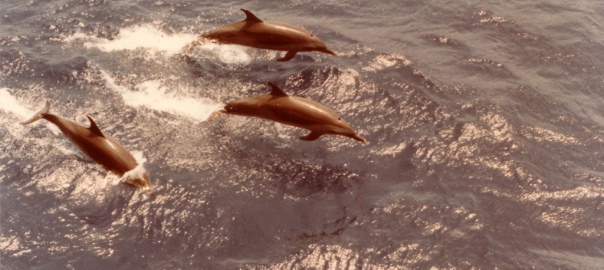Last week, I wrote about how animals becoming persons may lead to artificial intelligences and other unusual entities gaining personhood, and what the ramifications of that could be. There is another side to the question of animal personhood that I did not address, which profoundly impacts the way we perceive our world and all other life. That side is consciousness beyond humanity, and I feel it is well worth contemplating as our experience becomes increasingly technological.
When India declared that dolphins should have the status of non-human persons in May, it was fantastic news for dolphins and all humans (like me) who care deeply about animals. Much of the news coverage, like my previous post, focused on what exactly personhood meant for dolphins, how close it came to human rights, and where it might lead for animal rights. Only in passing was mention made of the extraordinary fact that, in saying “Whereas cetaceans in general are highly intelligent and sensitive… [it] is morally unacceptable to keep them captive for entertainment purpose”, the Indian government essentially acknowledged that our planet is home to conscious beings other than humans.
This acknowledgement is coming more and more frequently. On July 7, 2012, a bevy of prominent scientists (including physicist Stephen Hawking) proclaimed and signed the Cambridge Declaration on Consciousness, which lays out the scientific case for consciousness in a variety of animals. It is a document that may figure prominently in the history of intelligent life on this planet (you can read it in full here [PDF]). In its conclusion, it declares:
The weight of evidence indicates that humans are not unique in possessing the neurological substrates that generate consciousness. Non-human animals, including all mammals and birds, and many other creatures, including octopuses, also possess these neurological substrates.
–Cambridge Declaration on Consciousness
Whether or not you agree that consciousness is wholly generated by physical, neurological processes, this is an eye-opening development in science and intellectual thought. For over two thousand years, it has been argued by philosophers, theologians, and scientists that humans are superior to the “dumb beasts” of field and forest, because we possess some combination of reason, self-awareness, and an immortal soul, and animals do not. This flies in the face of most human history and basic human experience. The traditional beliefs of Native Americans and most other indigenous tribes recognized animals as beings equal to mankind—in some cases, descended from the same ancestors. Respect and honor was always due to animals, especially when hunting them for food and clothing. (Interestingly, it appears that many modern hunters preserve some measure of this ancient tradition.) And who has not looked into the eyes of an animal and sensed there a will, intelligence, and presence at once familiar and incomprehensible? Continue reading The Overwhelming Abundance of Consciousness
